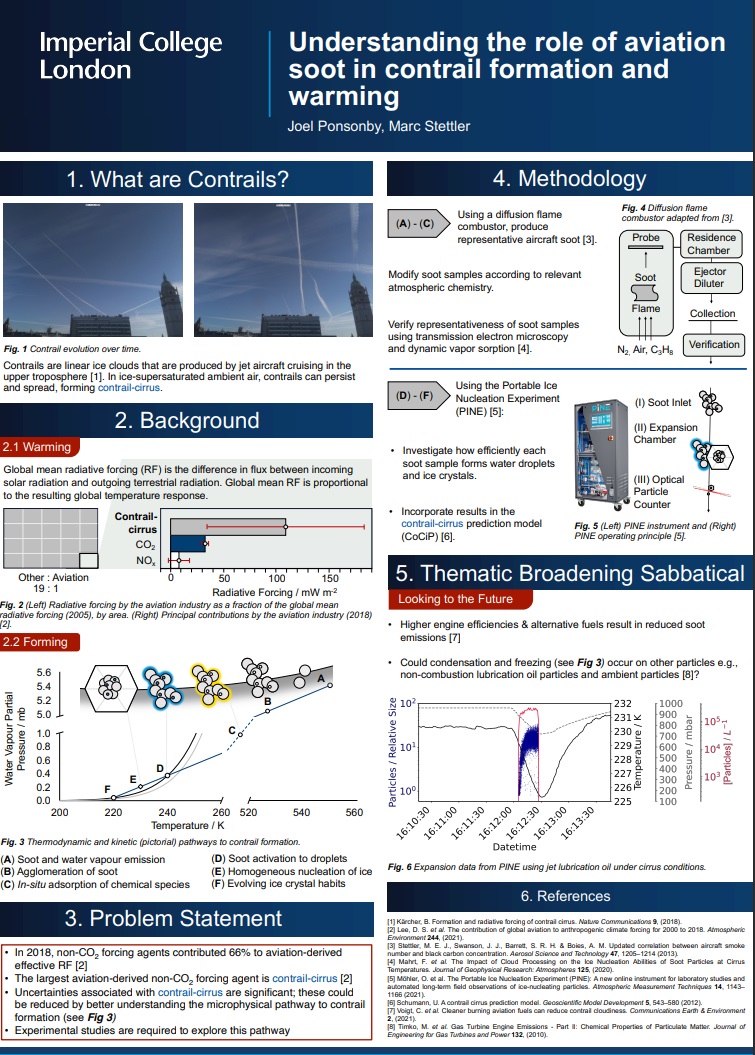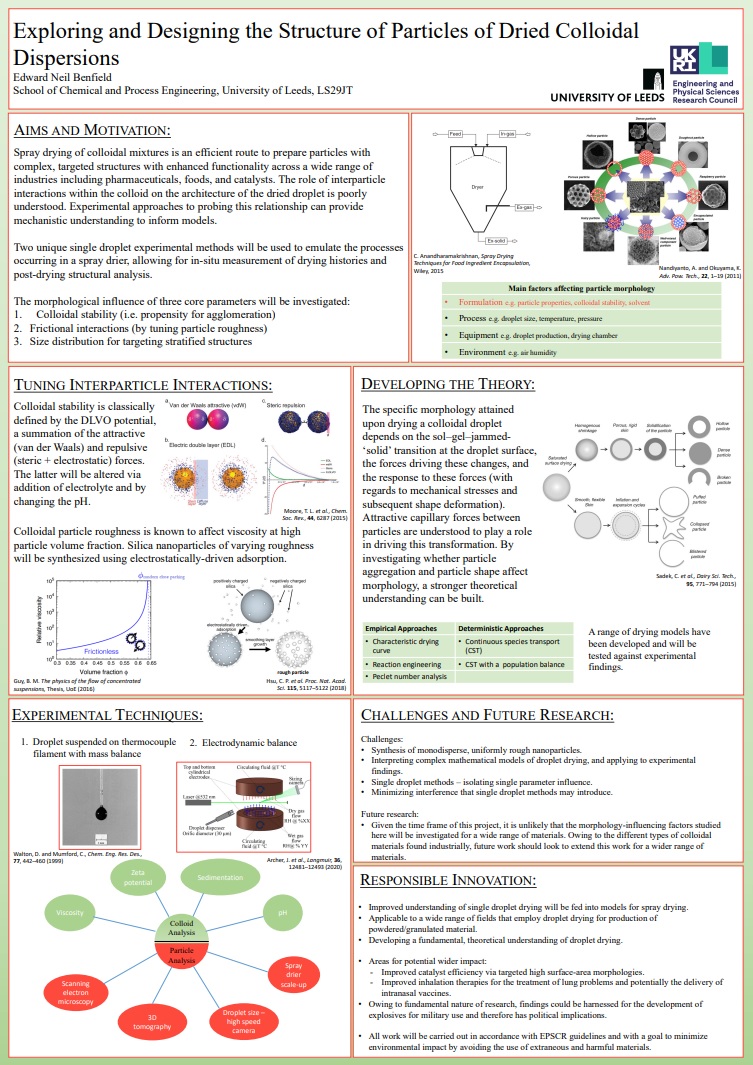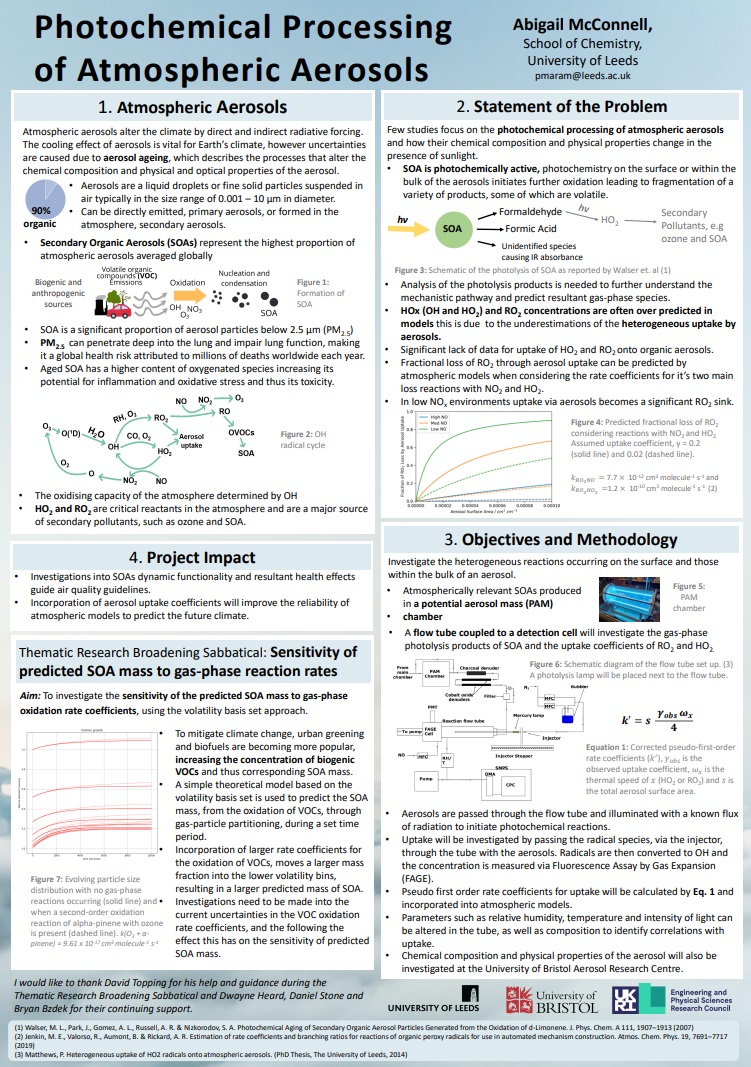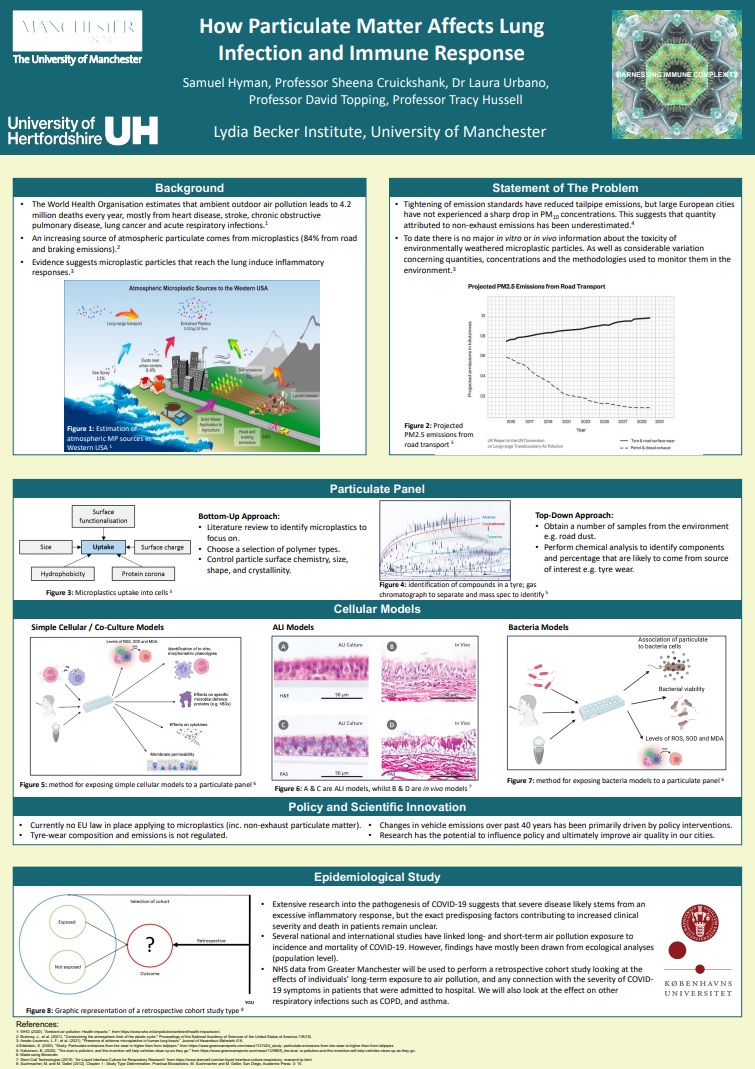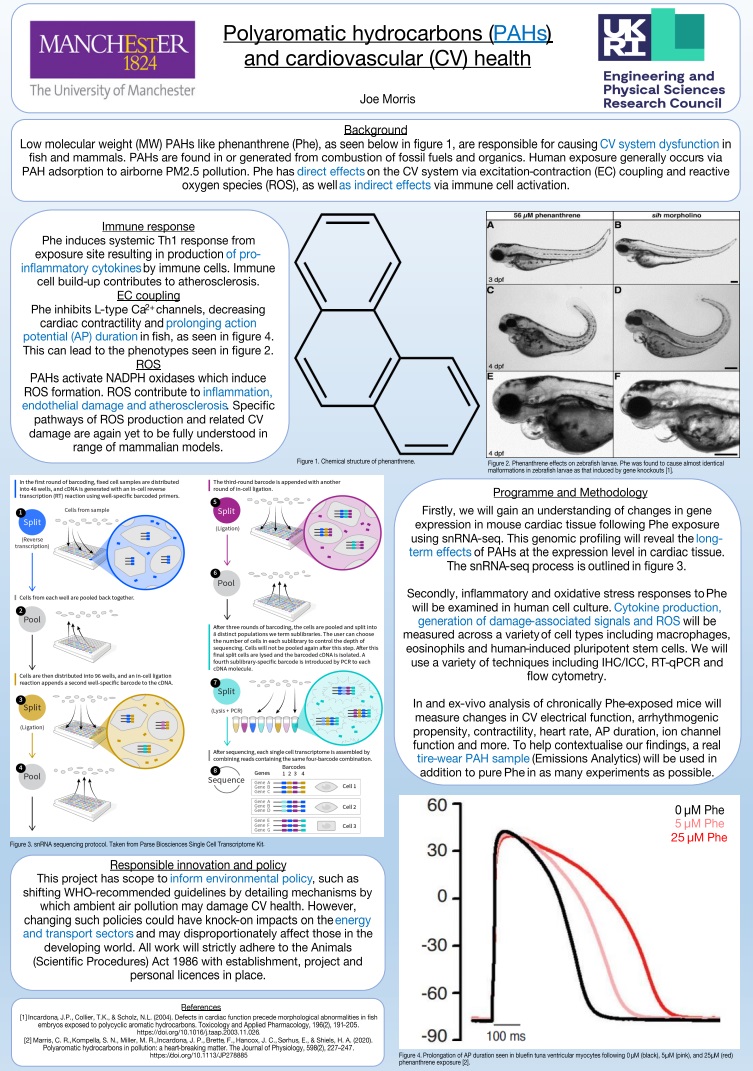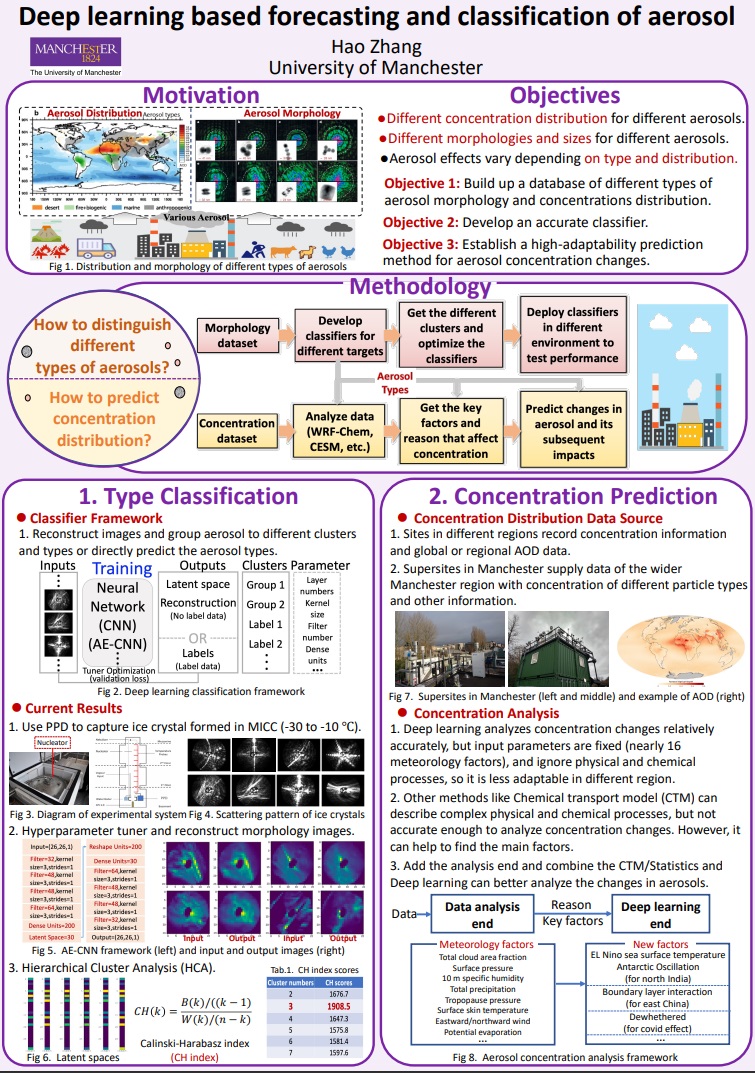PhD projects- Cohort 3 2021
Our third cohort of Aerosol Science CDT PhD students have recently finished their first-year CDT training at the University of Bristol and will soon join one of the CDT’s seven partner institutions to complete their PhD research. The posters available to view here were presented by the cohort at the CDT’s Annual Conference on 6th July 2022:

Environmentally friendly plasma coated inhaler cannisters
Theme: Aerosols and Health
This project is an industry funded studentship supported by H&T Presspart with potential for placements at their European sites.
Drug delivery from metered dose inhalers is reduced if the drug adheres to or reacts with the aluminium inhaler cannister. Cannisters can be coated with PTFE, but plasma coated cannisters are more environmentally friendly. This project will characterise plasma coated cannisters, their interactions with drugs, and the stability and delivery of drugs.
PhD student: Mahmoud Ahmed
Lead supervisor: Dr Matthew Jones

Mechanics of soft aerosols
Theme: Basic aerosol processes
Many biological and synthetic aerosols are composed of soft materials that behave somewhere between fluids and solids, including viscous droplets of mucus proteins and lipids that transmit COVID19. In this project, you will explore the soft-matter science behind aerosol suspensions by modelling how surface tension and viscoelasticity affect droplet production and adhesion. The outcomes could be relevant to the science of masks and droplet spreading.
PhD student: Jamie Mclauchlan
Lead supervisor: Dr Anton Souslov

Interfacial photochemistry in aerosol droplets: chemistry and climate impacts
Theme: Atmospheric and environmental aerosol
Aerosol surfaces hold the greatest source of uncertainty for atmospheric chemistry and climate impacts. For example, surface composition determines the ability of atmospheric particles to serve as cloud droplets. This project will study directly light-induced reactivity at the droplet-air interface of individual droplets, linking interfacial composition to atmospheric reactivity.
PhD student: M. Isabel Quant
Lead supervisor: Dr Bryan Bzdek

Novel measurements of aerosol thermodynamic and optical properties using phase shift photoacoustic spectroscopy
Theme: Measurement techniques
This studentship develops a state-of-the-art spectroscopic approach to enable measurements of light absorption and volatility distributions for aerosols containing volatile species. The outcomes of this project will transform UK and international research capability in observations of aerosol properties that remain among the largest uncertainties in climate science.
PhD student: Gwen Lawson
Lead supervisor: Dr Michael Cotterell

Advancing dispersion modelling of radioactivity releases resulting from increasingly frequent Chernobyl Exclusion Zone (ChEZ) wildfire events
Theme: Atmospheric and environmental aerosol
This project is supported by the Met Office as a case studentship.
During a wildfire within a radioactive environment, aerosols with a wide range of characteristics are derived. This multi-disciplinary studentship will work with both UK and Ukrainian partners to experimentally derive release dynamics and parameters for the various ‘fuel’ sources within the Chernobyl ‘Red Forest’ to enhance the current modelling and plume dispersion capability.
Lead supervisor: Dr Peter Martin

Dispersion behaviour and health effects of indoor aerosols
Theme: Atmospheric and environmental aerosol
Indoor aerosols may contribute to negative health effects. This project will measure the physical and chemical nature of indoor aerosol pollutants produced within the home. Placements to conduct an epidemiological literature review and investigate the health effects of these aerosol will enable a risk analysis of the measured aerosol.
PhD student: Prem Kumar Perumal
Lead supervisor: Prof Dudley Shallcross and Dr James Matthews

Controlling the Morphology and Phase of Dried Aerosol Particles
Theme: Basic aerosol processes
This project is an industry funded studentship supported by Future Formulation programme.
This project focuses on the drying of aerosol droplets to form particles of complex morphology, phase and microstructure. Of relevance to a broad range of areas from atmospheric aerosols to disease transmission to formulation science, you will use innovative laboratory tools and models to investigate the drying kinetics and phase change of aerosols.
PhD student: Barnaby Miles
Lead supervisors: Prof Jonathan Reid and Dr Rachael Miles
Development of a constant concentration particle source
Theme: Aerosol technology
This project is an industry funded studentship supported by Catalytic Instruments.
Worldwide, methods of measuring particles require calibration, yet none exist. This project develops a commercial device to produce a known concentration of particles by controlling the charge state and fluid dynamics. The work will harness results from recent modelling to develop and test the first aerosol “concentration controlled” prototype.
PhD student: Kelvin Risby
Lead supervisor: Dr Adam Boies
Transport and dispersion of non-exhaust pollutants
Theme: Atmospheric aerosol / aerosols and health
This project is an industry funded studentship supported by The Centre for Sustainable Road Freight.
The most damaging form of pollution is particulate matter, which can be formed by brake wear, tyre wear and resuspension. This project will investigate the transport and dispersion of non-exhaust pollutants in the flow around a vehicle, with the aim of predicting the exposure of pedestrians and other road users.
PhD student: Aaron Barber
Lead supervisor: Dr Megan Davies Wykes

Airborne particle collection into single droplets to analyse and identify harmful aerosol constituents
Theme: Measurement techniques
Aerosols are a primary mechanism for spreading harmful particles and diseases. It is crucial to improve the speed and accuracy of detection by concentrating the material during collection. This project aims to achieve this by investigating techniques for collecting aerosols directly into droplets using prototyping, experimental and modelling approaches.
PhD student: Priya Chopra
Lead supervisors: Dr Ian Johnston and Dr Loic Coudron

Classification of microparticles using two-dimensional scattering data and machine learning techniques
Theme: Measurement techniques
This project is an industry funded studentship supported by Alphasense.
Two-dimensional light scattering patterns contain information regarding the size, shape, and orientation of micro-scale aerosol particulates. However, these have proven difficult to classify using traditional algorithms. You will develop a machine-learning classifier to classify such particles as cirrus ice, bioaerosol, pollution, and other respirable hazards thereby providing hitherto unavailable real-time data analysis.
PhD student: Skhathi Mthembu
Lead supervisor: Dr Chris Stopford

Nanoscale analysis of London pollutant particles and their interaction with airway epithelial cells
Theme: Aerosols and health
This PhD project will compare the health impacts of micro and nanosized air pollution particles in outdoor and indoor environments in London. The student will establish which properties and components of different pollutants determine their cellular fate, their potential for cell & tissue damage and how these impact health outcomes.
PhD student: Alexander Mitchener
Lead supervisor: Prof Alexandra Porter

Microscale dynamics and light scattering characteristics of ice crystals in contrails
Theme: Basic aerosol processes / Atmospheric and environmental aerosol
The climate impact of flying is dominated by the effect of contrails, white streaks you often see trailing behind an aircraft in the sky. This project will reduce uncertainty and fill gaps in our understanding of the aerosol processes that affect how contrails form, survive and contribute to climate change.
PhD student: Joel Ponsonby
Lead supervisor: Dr Marc Stettler

Exploring and designing the structure of particles of dried colloidal dispersions
Theme: Basic aerosol processes / Technology
This project is an industry funded studentship supported by Future Formulation programme.
The drying of droplets of colloidal dispersions is common to many systems and a rich variety of particle morphologies and structures are formed. This project will explore, using experiments interpreted by models, the mechanisms governing structure formation. Through this knowledge new particles will be designed and engineered.
PhD student: Edward Benfield
Lead supervisor: Prof. Andrew E. Bayly

Using microfluidic technology to measure and identify biological atmospheric ice-nucleating particles
Theme: Atmospheric and environmental aerosol
The formation of ice in clouds is one of the least well understood aspects of our planet’s climate system. Our knowledge of the sources, sinks and global distribution of ice-nucleating particles is lacking. In this project you will use new technologies to better understand biological ice-nucleating particles.
PhD student: Polly Foster
Lead supervisor: Prof Benjamin Murray

Modelling of airborne transmissions of respiratory droplets containing COVID-19 virus
Theme: Aerosols and health
COVID-19 virus spreads by the inhalation of “airborne” microscopic respiratory droplets and after evaporation by aerosols of their solid residues. In this project, a first-principle model of the evaporation and subsequent dispersion of the aerosol in air within a room will be developed to provide effective guidelines for safe and social distancing.
PhD student: Benjamin Mignot
Lead supervisor: Dr Tariq Mahmud

Photochemical Processing of Atmospheric Aerosol
Theme: Atmospheric and environmental aerosol
Atmospheric aerosols impact global warming and human health yet chemical transformations at their surfaces in the presence of sunlight are poorly understood. In this project laboratory studies using two complementary approaches will be used to study photo-processing at aerosol surfaces, with the results exploited using a detailed atmospheric model.
PhD student: Abigail McConnell
Lead supervisors: Prof Dwayne Heard and Dr Bryan Bzdek

How atmospheric particulate affects lung infection and immune response
Theme: Aerosols and health
Air pollution poses a serious threat to human health and is an aggravating factor in both viral and bacterial pulmonary infections. This project will employ advanced in vitro and computational models to develop an understanding of the complex and still vastly unexplored interaction between bacteria, pollutants and immune cells.
PhD student: Samuel Hyman
Lead supervisors: Prof Sheena Cruikshank and Dr Laura Urbano

Air pollution and cardiac health
Theme: Aerosols and health
Air pollution enhances the risk of cardiovascular disease through direct and indirect effects on the heart. Through epidemiological investigation, and in collaboration with industry, this studentship will determine the role of altered immune function and oxidative stress in contributing to pollution-associated cardiac dysfunction using in vitro and in vivo models.
PhD student: Joe Morris
Lead supervisor: Dr Holly Shiels

Deep learning based classification of aerosol particles from holographic imagery
Theme: Measurement techniques
The impacts aerosol particles have are linked to their origin. Very few experiments are able to record the information to make that distinction in real time [e.g. volcanic ash detection]. However, digital holography combined with deep learning algorithms offer an exciting new potential to make that distinction.
PhD student: Hao Zhang
Lead supervisor: Dr David Topping

EPSRC CDT in Aerosol Science
University of Bristol
School of Chemistry
Cantock's Close
Bristol, BS8 1TS
aerosol-science@bristol.ac.uk
Partner Newsletter
Sign up to receive monthly news and updates from the CDT in Aerosol Science, as well as events, training and research webinars.

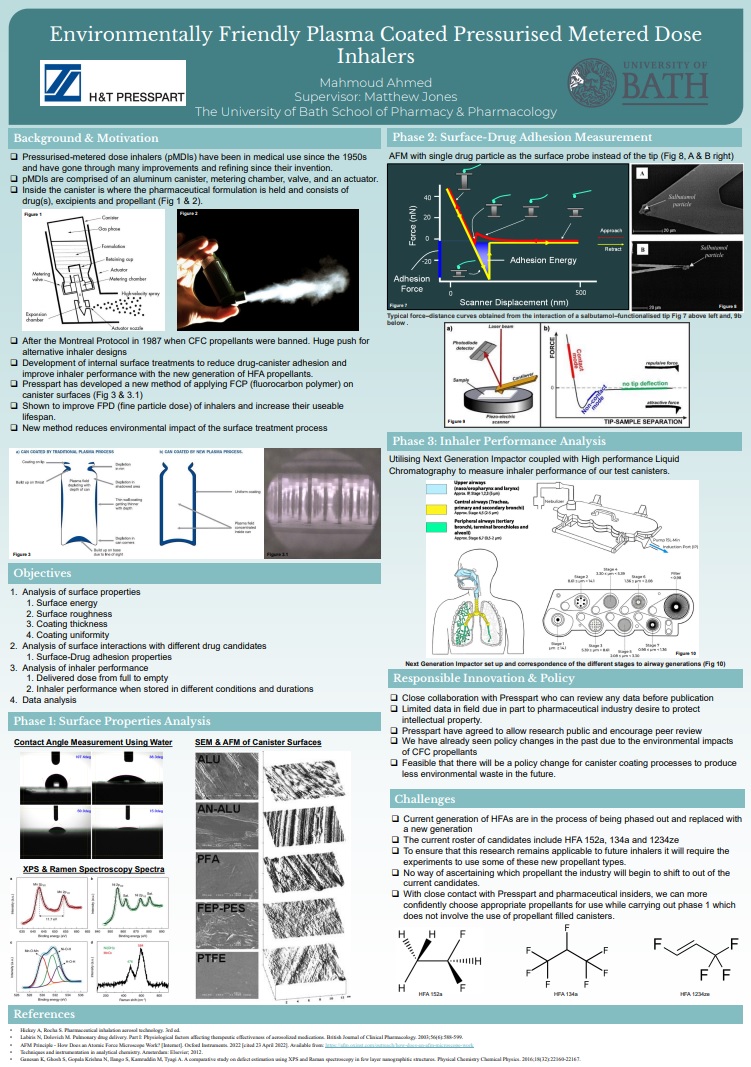
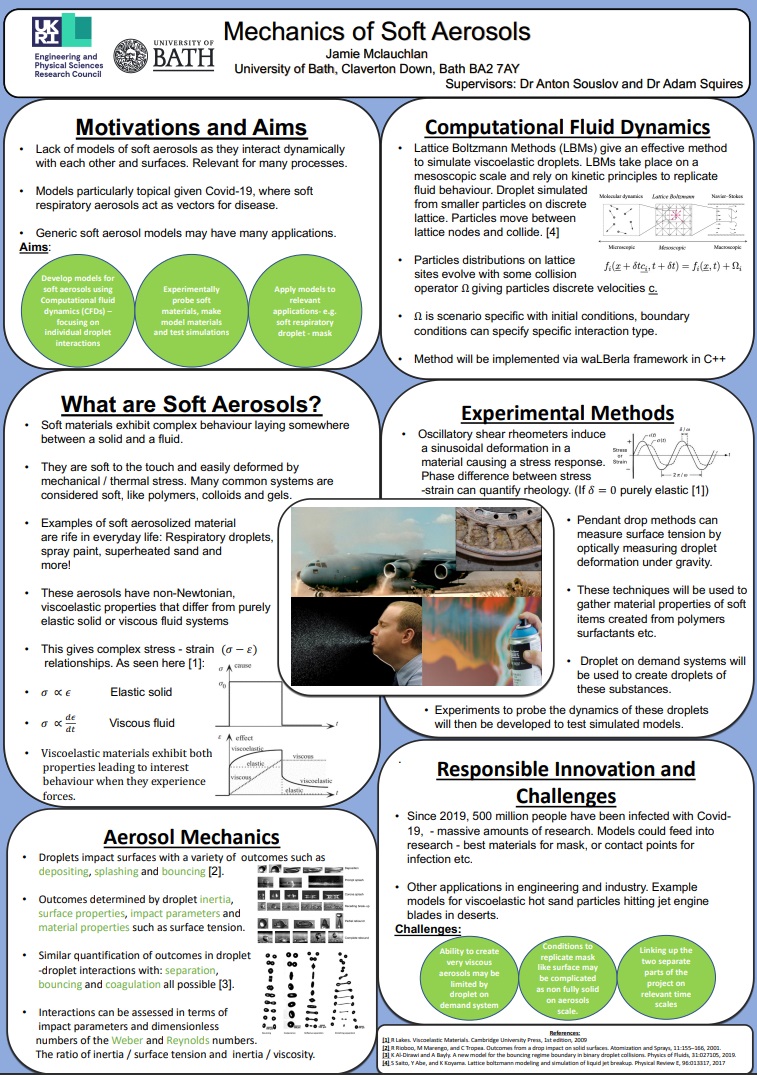
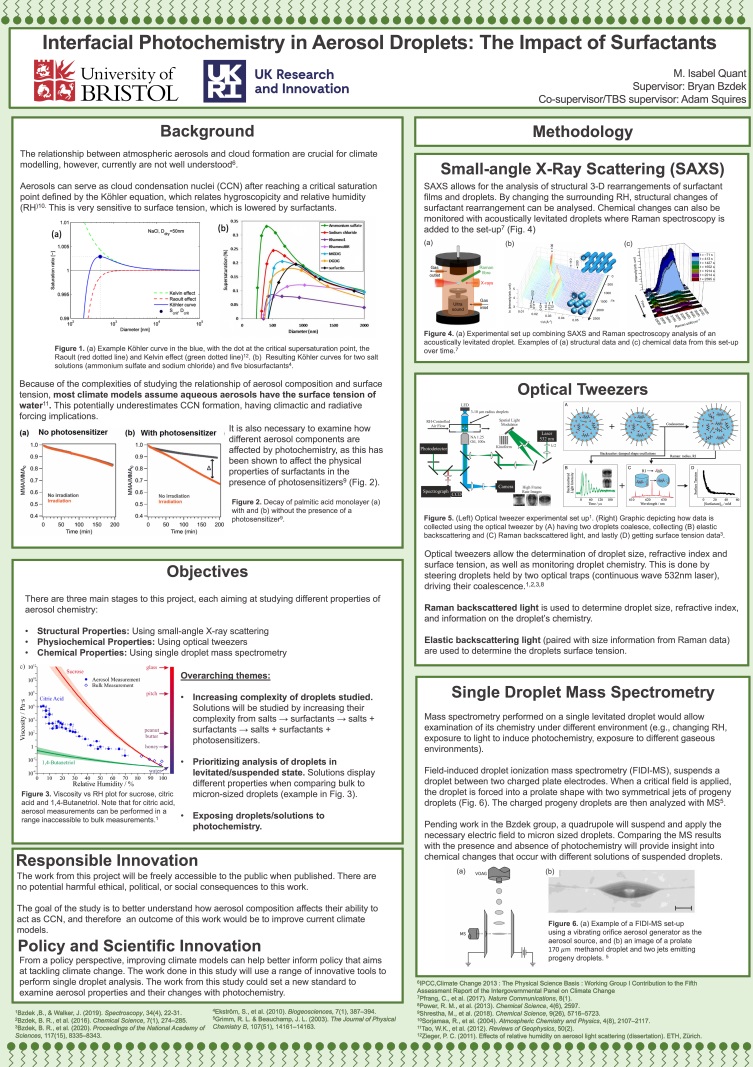
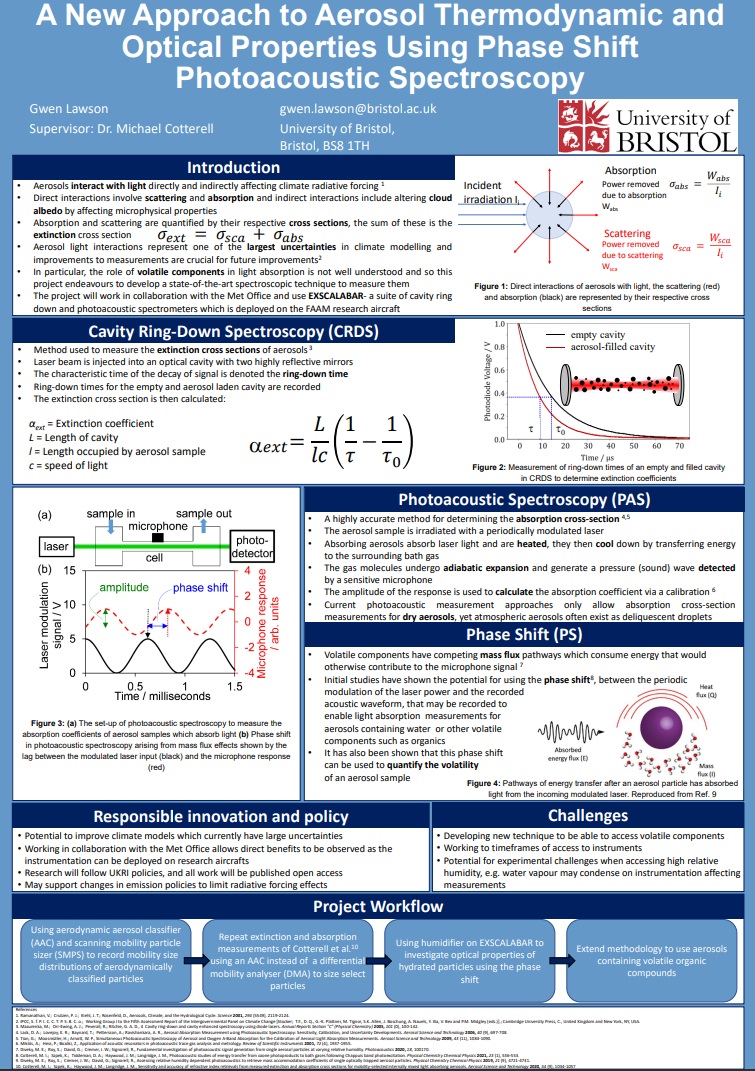
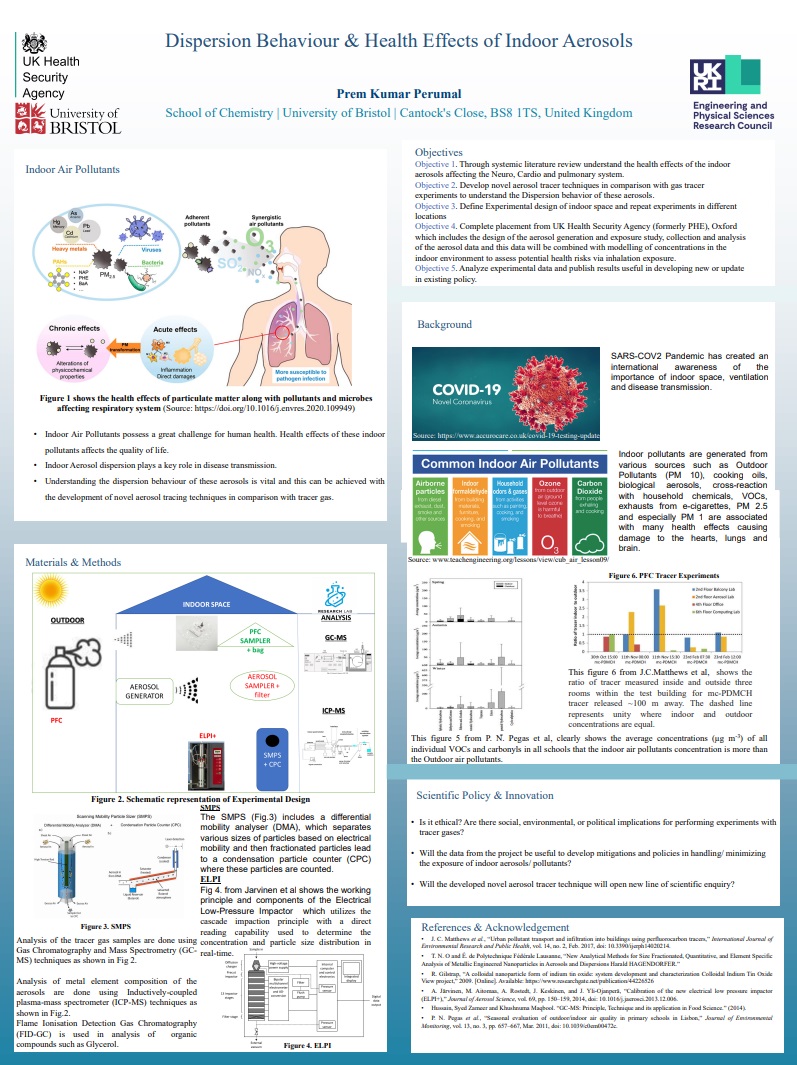
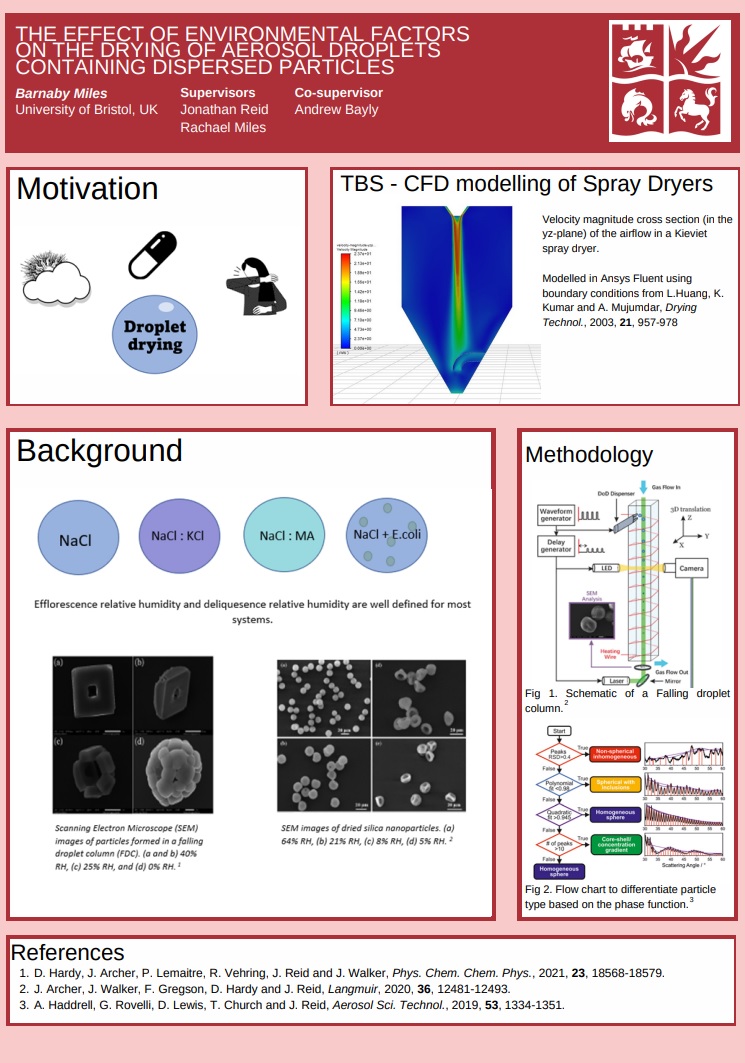
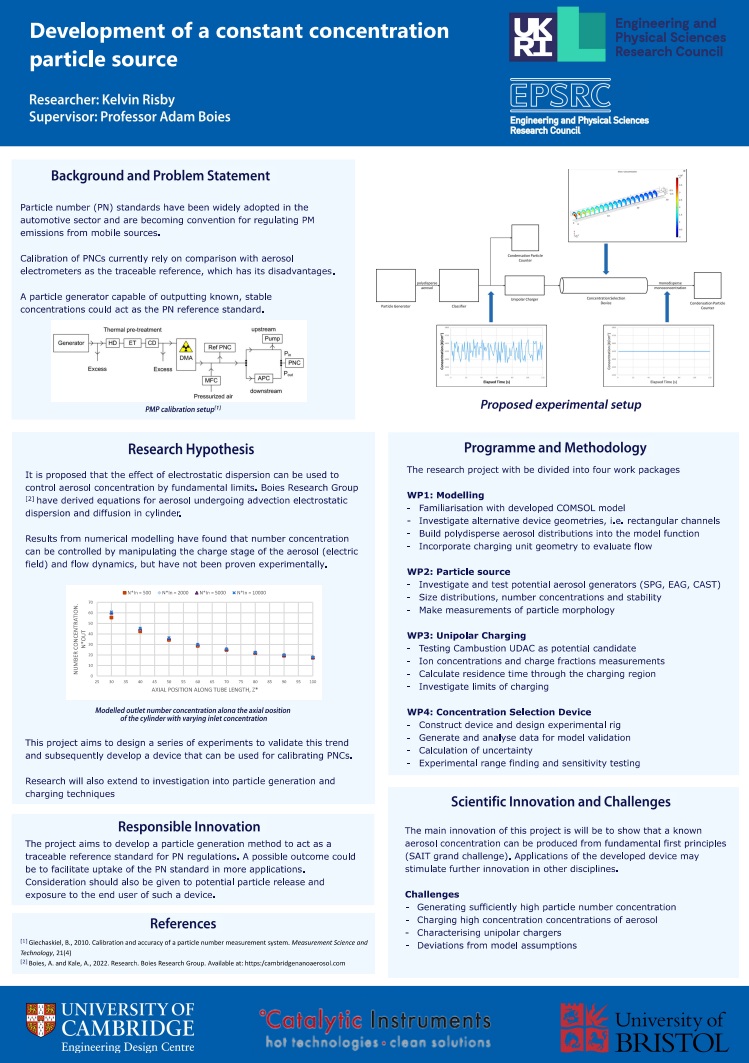
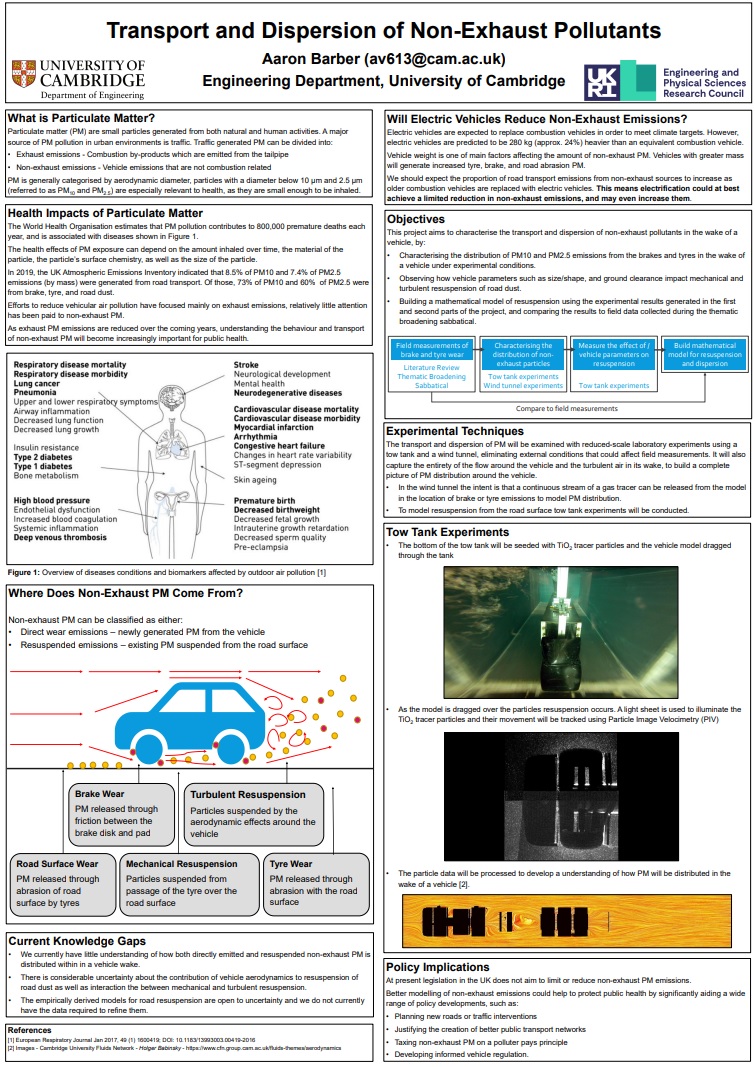
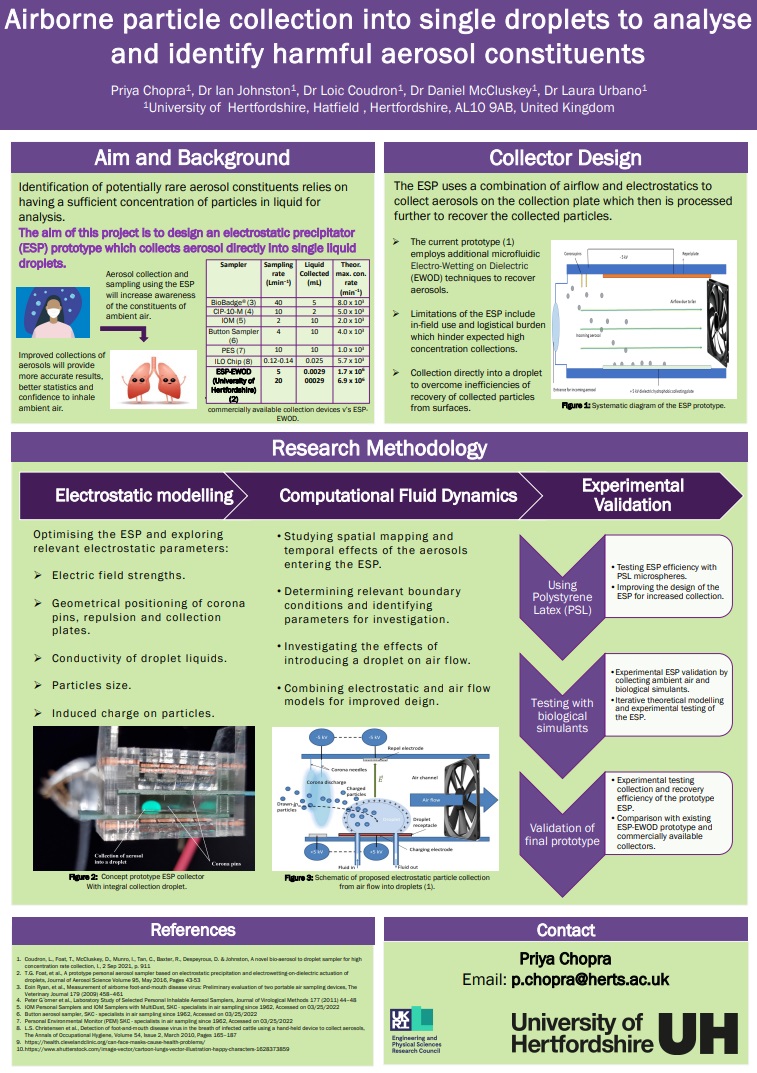

![[A. Mitchener] CDT Conference Poster 2022](https://www.aerosol-cdt.ac.uk/files/2022/07/A.-Mitchener-CDT-Conference-Poster-2022.png)
